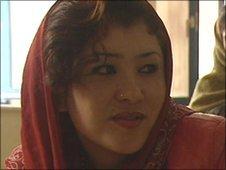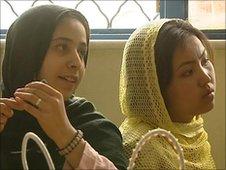BBC News, June 29, 2010
The Afghan women jailed for “bad character”
"If these women were treated with justice, I don't think 50% of them would be in here. They are here because of problems in the family or personal vendettas"
By Lyse Doucet
Meet Sorarya and you meet "attitude".
It has something to do with the way she wears her red tunic and trousers, her short cropped black leather jacket, and the way she chews gum and rolls her eyes.

Sorarya is one of those jailed for 'bad character'
"What are you here for?" I ask as we sit in a makeshift beauty parlour, surrounded by a group of Afghan women in less flamboyant attire.
"Should I tell her?" she asks the other women with a mischievous grin.
"Bad character," she says after a moment's hesitation. She suppresses a giggle then doubles over with laughter. Everyone giggles with her.
Sorarya doesn't explain what that means. But almost every woman in this room has been accused of "bad character" of one kind or another.
Missing school
We are sitting in Badam Bagh, or Almond Garden, Afghanistan's only prison for women in the capital Kabul.
The prison is a window on a world where, outside these walls, women are constantly judged against a standard that makes many of their stories difficult to fathom.
Sixteen-year-old Sabera, with a pretty yellow head scarf, frets that she is missing school.
"I was about to get engaged, and the boy came to ask me himself, before sending his parents. A lady in our neighbourhood saw us, and called the police," she explains.

Sabera (r) was jailed after a boy came to her house to propose
She was sentenced to three years but, in an act of mercy, it was shortened to 18 months.
Fellow inmate Aziza was accused of running away from her husband. She says she was acquitted two months ago, but still languishes in prison.
A senior official in Afghanistan's Ministry for Women's Affairs told a recent UN workshop that about half of Afghanistan's 476 women prisoners were detained for "moral crimes".
That includes everything from running away from home, refusing to marry, marrying without their family's wishes, and "attempted adultery".
"In many cases women run away because they can't bear the domestic violence and then they are picked up and taken into custody for a long time," explains Nader Nadery, a commissioner at Afghanistan's Independent Human Rights Commission.
'What's my crime?'
The legal system further tips the scales of justice.
"Running away is not defined in any penal code," says Mr Nadery. "If there is no provision in law, they refer to Islamic Sharia law and this gives them an open hand."
Mastura is a waif of a woman, 19 years old, and accused of adultery by her husband.
"I was three months pregnant, and he said the child wasn't his and he kicked me out of our house," she says, cradling her infant son as she perches on the edge of a metal bed in her communal cell.
"My mother lodged a complaint against him but the government locked me up."
All the women in her cell, from teenagers to an 80-year-old woman veiled in black, listen quietly as she tells us her story. But they must know it by now.
"Every time I think about it, I cry, and I say to myself, 'What crime have I committed that I should be in prison?'" wails Mastura. She appeals to President Hamid Karzai to allow all the women to go home.
Mastura named her son Izzatullah, which means "God's honour". For an alleged crime linked to his mother's "honour", he's been born a prisoner.
About 40 other young children also share their mother's fate, living in Badam Bagh.
They sit on tiny plastic chairs watching television in a room filled with stuffed toys, and bright colours.
It could be a kindergarten anywhere - except the toddlers are minded by a woman who has been convicted of murdering her stepson. She insists she is innocent.
Prison authorities say children are taken away to a boarding school after the age of five.
Handicraft classes
Badam Bagh, home to 147 women and children, was opened two years ago and markedly improved prison conditions for women.
They used to be held at Afghanistan's most notorious jail, Pul-e-Charki, which now has some 5,000 men.
A separate facility was built, helped by foreign aid, after concern grew about women's conditions. An Afghan parliamentary report had highlighted cases of women being raped inside prison walls.
The new centre, a three-storey white building, is bright and clean, and women move freely between their cells and communal areas. Handicrafts allow them to earn some money, and computer classes teach new skills.
"Abuse and arbitrary detention is less widespread but there is still a concern about inadequate delivery of justice," says Mr Nadery.
"I know the reality of life for Afghan women," says Badam Bagh's no-nonsense prison director, Zarafshana. Unusual for an Afghan woman, she wears a business suit and no headscarf.
"If these women were treated with justice, I don't think 50% of them would be in here. They are here because of problems in the family or personal vendettas."
As we sit in a glassed in room with Zarafshana, we see Sorarya strutting down the corridor.
She told us she would be released today. But when we leave she is still waiting for clearance to re-join the world outside.
Characters Count: 6687
